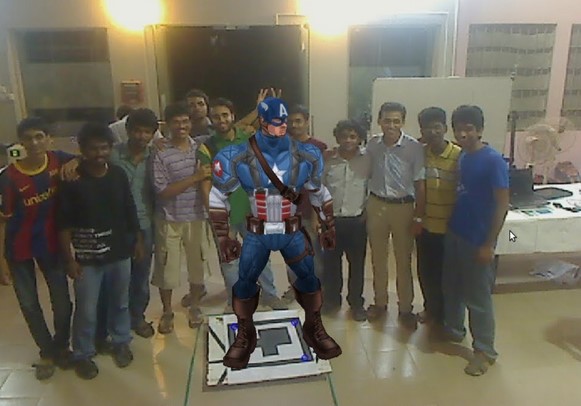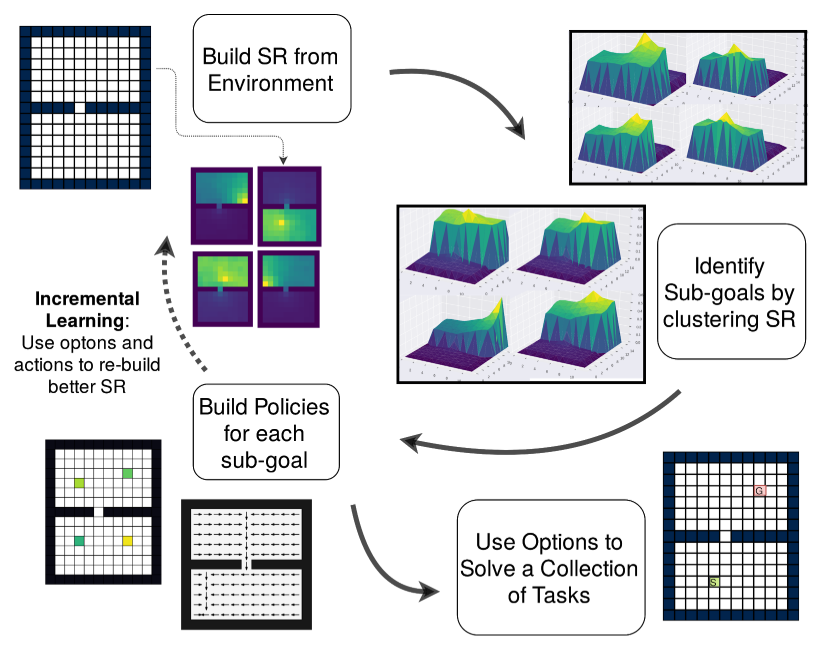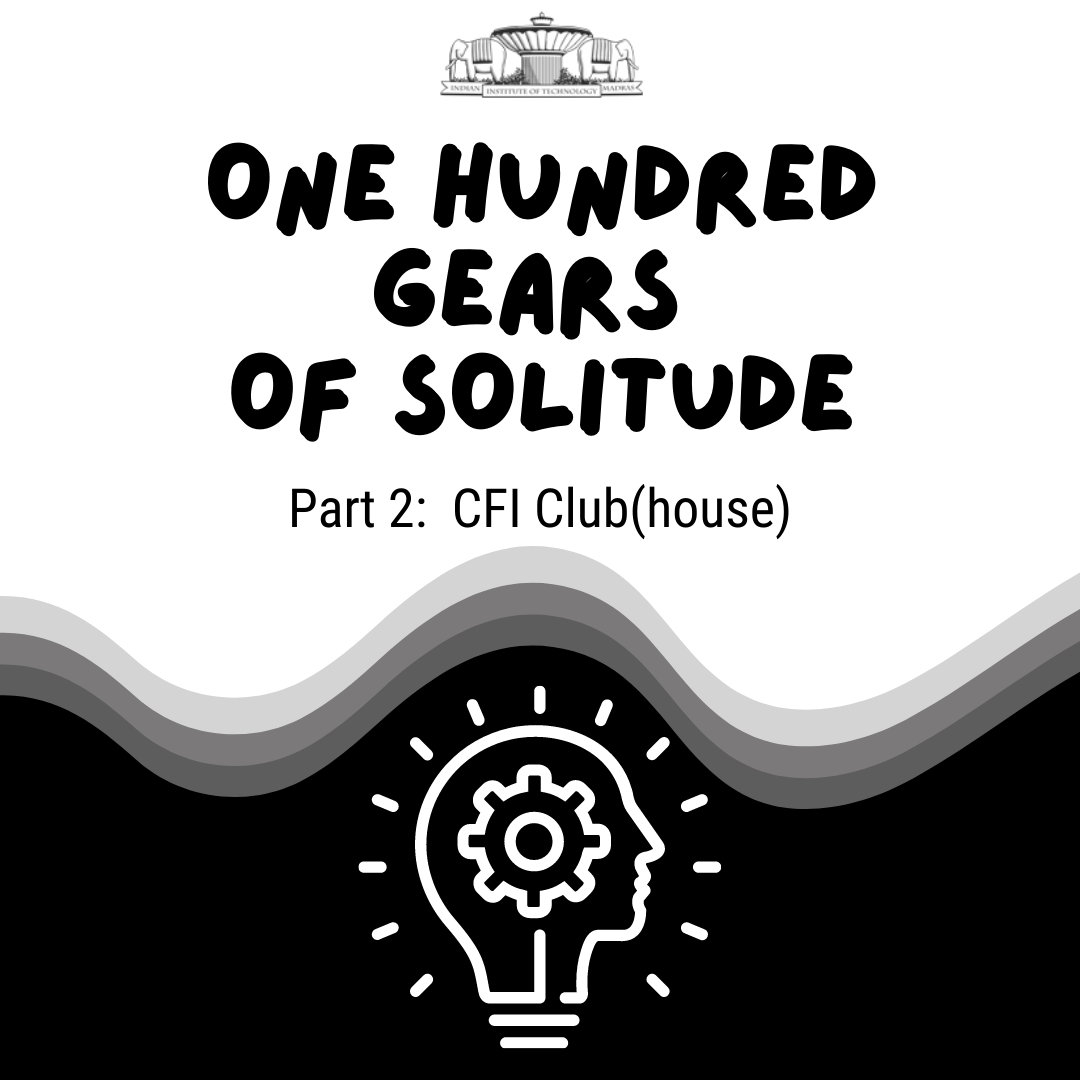Design: Abhiram Pavithran O
Editor: S Vishal
Imagine yourself waking up every day to work on cutting-edge technology problems with handsome returns. What if, at the same time you could be directly contributing to the well-being of society? As satisfying as this might sound, this stands in stark contrast with typical companies we see today – purely profit-driven entities for which giving back to society is oft symbolic, rather than meaningful. Perhaps it’s a conflicting objective to making a successful business. Or is it?
HyperVerge is a deep-tech startup from insti that has now cemented itself as a market leader in cutting-edge technologies, delivering high-accuracy AI solutions at scale. At the same time, it is setting an example by actively working towards the upliftment of society.
To dig deeper into their story, we reached out to Kishore Natarajan, one of the co-founders, who gave us some great insights into their journey, from being an enthusiastic group at CFI to the growing economic powerhouse that it is today.
The Origins
Kishore mentions a specific incident that was pivotal in shaping their thoughts about what they wanted to do in their lives. It was that time of the year at insti when CFI is bustling with activity. Among the different groups pulling off all-nighters to make their innovative ideas work, CVG (Computer Vision Group – now known as CVI) was preparing to represent insti at the IARC (International Aerial Robotics Competition). As fate would have it, right before the competition, their module got heavily damaged, forcing them to drop out of the event. When this happened, a number of people left the team. At this point, Kishore said that there was a common feeling amongst the rest:
When a lot of these folks dropped off, there were a bunch of us who were left and we were like, okay, so what do we do next? Because a competition just can’t be the end of all of this, right?
After weeks of contemplation, an idea had sprung up in their minds. Why not use their expertise in computer vision to provide consulting services to companies? That’s when they realized that they could do something together that could potentially create revenue.

The team then began experimenting with a variety of small industrial projects using computer vision. It was at the CFI open house, where the group got to showcase all the work that they’d done; of which their augmented reality (AR) exhibit generated a lot of excitement. To their surprise, the very next day, they received a call from the Dean (IC&SR), Dr. Krishnan Balasubramaniam, asking them to take a shot at a project given to IIT-M by the Indian Railways. Working on such a high profile assignment while in college was an incredible experience for them. They spent days and nights experimenting with various solutions to the problem and realized that they could actually be solving real-world problems while making revenue at the same time.

In due course of time, they gathered experience by working on a number of industrial projects and wanted to see what the corporate world looked like. So in their third year, the members took up interns as an opportunity to gain such insights. Most of them, however, were disillusioned with the experience. The feeling of excitement that they had while working on challenging problems together was almost non-existent in their interns.
Kedar Kulkarni (co-founder & CEO) talking about their exciting experiments with computer vision at the time, shortly before HyperVerge was incorporated
At that point, they were very clear that the logical way forward for them was to work towards starting up. But there were other concerns looming. As most of them were from middle-class backgrounds, their parents were, naturally, anxious as well. At the time, starting up was not as ubiquitous as it is today. As many insti startups can relate to, it wasn’t an easy call.
To make themselves an independent entity that could sustain itself, they needed to find a way to bring in revenue. They had to answer a crucial question: What products should they spend their time on building? Kishore doesn’t recollect going on a tour during his final year. The team was working extremely hard. After scrambling through loads of business models, publications and experimentation, he says that they had a hunch they’d discovered the ‘missing piece’.
When we did our research, KV (Vignesh) discovered that there was something called deep learning
At that time, almost no one had heard of one of the most pervasive terms of today. It was an exciting new tool that had promising applications in image processing that had never been seen before. Around the time, with camera phones becoming popular, and Instagram going viral, people were taking tonnes of pictures. With a cocktail of circumstances coming into play, it seemed like the most opportune moment to develop a smart photo-sharing app that leveraged the capabilities of deep learning. If it worked out, there was virtually nothing stopping them from there. In addition, they had also come up with the idea of a cloud-based video processing platform for enterprise customers.

Taking the dive
Convinced that the market that they were looking for was in the U.S., they decided to travel half-way across the globe to raise funds, and hopefully find customers. While Kishore and Praveen took over all the responsibilities in India, Vignesh and Kedar booked the cheapest flight they could find to New York. Kedar (the CEO), in a blog post, mentions that this was one of the most important trips they had ever made[1] :
While we never thought of it in that way, deep within we knew this trip would be the make or break event for HyperVerge
Talking to several insti alumni and others from industries and universities brought them clarity and confidence. Presenting their ideas to potential investors for the first time, it took a while before they could get their act together and make that perfect pitch. In another post, Kedar’s words express that transformation :[2]
Our journey so far had taken us to extreme lows where we were starting to believe that our ideas did not seem to excite anyone except us. It only took a few incredible conversations for that to change. And it changed in a huge way. Finally, our pitch started working. More importantly, we had found a story, a vision that we ourselves could honestly believe in.
Back from a fairly successful trip, the hunt for customers continued. Ideas were floated all over the place, from marketing, food, healthcare and almost every other sector they could think of, hoping to bridge the problem-solution fit. Talks with potential customers were simply not getting converted into deals. Most importantly, having to educate them about the new technology was a challenge. The photo-sharing app hadn’t been picking up either, and to make matters worse, Google Photos had released an update, introducing the same photo categorisation feature that they’d released just a month ago – and it was available for free.[3]
It almost seemed as if the HyperVerge dream was falling apart. With less than a year’s worth of cash left in the bank, the future seemed obscure. Kishore says that it was unimaginable for them to think that they may have to lose the wonderful group of people they had been working with for so long :
When we looked at our team and said, boss, we can’t get to work with such amazing people who are so driven and motivated by the same kind of things that you think will work. And that meant we could just not let the team down.
Looking Inwards
If you’ve ever been in a group in such trying times, you begin to think deeply about why you got together in the first place. That’s exactly what the team decided to ask themselves. In what they consider one of the most critical meetings during their journey, in December 2016, all the thirteen members of the team got together to meet at the cafeteria to answer one question :
If we were all to work together on something together important that would mean a lot to us in our lives, what would that be? We asked ourselves that question very hard
There was a consensus that they wanted to work on fundamental issues in society: education, healthcare, rural unemployment and the like. Making their intentions clear to their investors, they looked to them for guidance. That’s when a lot of advice came in from several quarters, and in particular, from Venky Harinarayan, who made it clear to them that even making a dent in any of those areas was not practical for a startup. To make a fundamental impact in this world, mere intent wasn’t enough. It needed money, the capability, and most importantly – time, which is exactly what startups don’t have. They needed to stand the test of time.[6]
Sridhar Vembu, co-founder and CEO of Zoho, heard them out as well. What he had done with Zoho was and still remains a huge inspiration to them. From being a bootstrapped company, Zoho is now setting an example with unconventional training programs at the Zoho University (see Zoho Schools of Learning), which takes in several talented students who are unable to pursue higher studies due to financial constraints, and equips them with skills to build a career, coupled with a source of income, actively bringing their families out of their cycle of disadvantage. They’d gone on to do things that a government could not hope to do. Kishore says that this example gave them the clarity they needed :
We saw that we could be building a business and at the same time contributing to people without confusing both of these in our heads.
Sridhar cut out the task for HyperVerge and suggested that they relentlessly focussed on their revenues to become a profit-making entity. They set out with the monumental challenge of making half a million dollars in the first year. Pulling out all the stops, the team succeeded, and in fact, doubled their returns in the next.[3] Zoho became one of their first clients.
Technology was our hammer and we were hitting every nail we could find, hoping that one or two could go in… and that’s how we ended up working in Fintech and geospatial services
AI solutions built by HyperVerge are powering applications for large enterprise clients in financial services, telecom, energy, security, and defense. Today, the company has over 80 clients including Jio, Vodafone, SBI Card and Bajaj Finserv amongst many others. It leads the market in V-KYC (video-KYC) services, with over 280 million KYCs in 2019, and the highest accuracy of 99.5%. [4]

Giving Back
Having achieved formidable success, they began to bring their focus back onto the fundamental problems they had been looking forward to work on. But when should a startup begin contributing to society? Is it when it reaches a certain level of economic independence? Or when it becomes a unicorn?
For HyperVerge, the answer was loud and clear – now was the time to do it.
HyperVerge has now begun working towards achieving its ultimate goal. They now have two people (also insti alumni) working with the job title of ’contribution’. Eevera, who has been working on grassroots education for the past seven years, with first-hand experience trying to understand education in rural areas; and Gayathri, a CSE graduate, who after working at Goldman Sachs realized that making money couldn’t be the purpose of life, and discovered ways to create real impact herself. The two are now working with a cohort of 20-30 people from rural areas, seeing how they could be empowered with a career trajectory that could make their salaries three or four times more than what they earn now.
Over the next year, the team hopes to bring over two thousand people out of their cycle of disadvantage. How, you ask? Kishore elaborates that some effective ways are to help them get a job or enabling them to become micro-entrepreneurs through funding. The most powerful way, however, is to provide just one person in the family an education who would ensure that the rest of the family gets educated.
Every year, several thousands of people continue to migrate to cities in search of job opportunities and the hope of a better income. This is mainly because companies set up offices in major cities. To reverse this trend, HyperVerge also plans to open an office in Coimbatore, which would stand as a model that goes into other villages and towns around the district.
Food for Thought
One of the most important things to keep in mind while starting up, Kishore points out, is having clarity and a sense of direction. This happens especially when building a startup, where there is no written ruleset. It’s very easy to get lost and people could be saying anything that comes to their mind.
Advice comes free of cost. Everyone gives you advice. You need to have the clarity to filter out and take what works and not what doesn’t. Sometimes, you’ll be absolutely wrong.
In their case, Kedar Kulkarni (co-founder and CEO) played a pivotal role in this, making sure that the team stayed together through all of their highs and lows, sticking to what they believed was the right direction when the times ahead were blurry. ‘His calm-headedness, and ability to convince and give confidence to anyone was an interesting ability’, says Kishore. When HyperVerge needed cash to survive, simply the conviction and confidence that Kedar had expressed to the clients gave them the belief that this, indeed, was a group of people they could pay money upfront to work with.
One of the biggest advantages that people at insti have, is what Kishore calls ‘crazy optimism’. There’s almost nothing to us we would call outright impossible. But starting up is no walk in the park. Being college kids with zero experience, how do you learn the ropes?
One way is to simply do what you think is right, get bruised by your mistakes and learn from them. If you, instead, decide to hear from people who have traversed that path already – you get a heads-up on what to expect. Finally, the most essential way to learn is to read documented literature on the subject. Reading about isolated instances may provide inspiration, but these don’t give you the complete picture, akin to the parable of the blind men and the elephant. Comprehensive studies, on the other hand, show you common patterns of what works, and what doesn’t – something you can find in a book, and not a blog. “It’ll open you up to new ideas and contexts you were never aware of”, he says.
In all of these years, what has remained constant is not the problems that we started with, nor is the technology that we started out with at the core. The only thing that has remained in all these years is this set of people who are crazy enough to say that this is what we will do.
This, to Kishore, is the most important thing they had, for which they continue to be immensely grateful for:
We’re extremely grateful for having the kind of company that we’ve had, where you can look to your left and right and still be like, man, these are an amazing set of people to be working with! Not just because they’re smart. But because they’re driven for the right reasons and the right motivation to fight.
You’re probably a starry-eyed student hoping to achieve your dream of starting-up some day. It’s certainly no cakewalk, and it’ll be riddled with potholes where you’d least expect it. To the future startups of insti, he just has one last piece of advice :
Just make sure that you stay joyful, whatever it is that you’re doing; That is the baseline. Most people don’t talk about it, but if you’re building a startup, and you’re yelling at your teammates, I don’t think you might want to do that journey.
You become sad, disappointed and anxiety levels shoot up – then it’s probably not the right thing to do.
Talking with Kishore opened my eyes to the thought process behind a successful startup, and what a gruelling, yet exciting and rewarding expedition it could be. For me, the biggest takeaway from their journey is not just the fact that they succeeded in their pursuit of becoming a startup. I stand in awe of the quality of human curiosity and drive to explore the unknown; and the wonderful things that could happen when a group of people come together and put all their might into doing something they truly believe in.
—
check out the Hyperverge blog to get a taste of Hyperisms, and get to know more on their backstory and advice on starting up
References :
- How we raised a million dollars in seed funding – Part I
- How we raised a million dollars in seed funding – Part II
- HyperVerge Work Stories – The Origin Story
- KYC market leader HyperVerge enters V-KYC with SBI Card as marquee customer
- Townhall Jan 2020: HyperVerge Origin Story and the Contribution Angle
- How we found our purpose
Startups of insti is a series where we cover the story of startups founded by insti alum to inspire and motivate the entrepreneurial junta among the current students. Comments and suggestions are always welcome, you can send them to us at [email protected].




